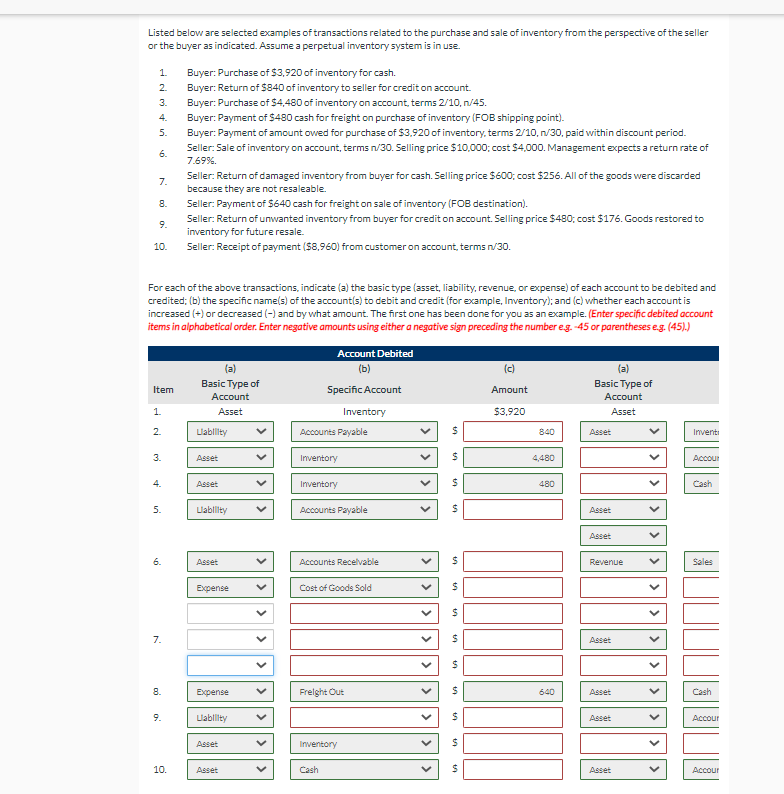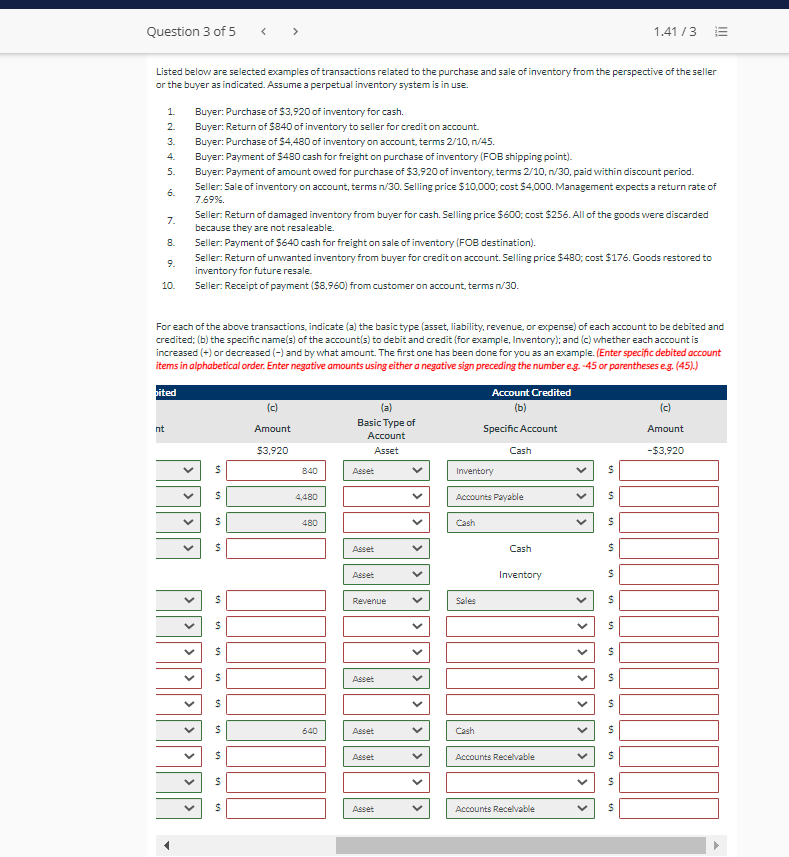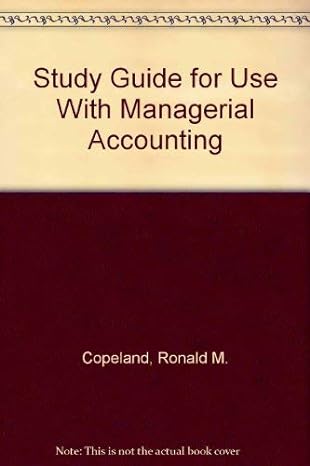

Listed below are selected examples of transactions related to the purchase and sale of inventory from the perspective of the seller or the buyer as indicated. Assume a perpetual inventory system is in use. 1 2. 3. 4. 5. 6. Buyer: Purchase of $3,920 of inventory for cash. Buyer: Return of $340 of inventory to seller for credit on account. Buyer: Purchase of $4,480 of inventory on account, terms 2/10, 1/45. Buyer: Payment of $480 cash for freight on purchase of inventory (FOB shipping point). Buyer: Payment of amount owed for purchase of $3.920 of inventory, terms 2/10,1/30, paid within discount period. Seller: Sale of inventory on account, terms n/30. Selling price $10,000; cost $4,000. Management expects a return rate of Seller: Return of damaged inventory from buyer for cash. Selling price $600 cost $256. All of the goods were discarded because they are not resaleable. Seller: Payment of $640 cash for freighton sale of inventory (FOB destination). Seller: Return of unwanted inventory from buyer for credit on account. Selling price $480; cost $176. Goods restored to inventory for future resale. Seller: Receipt of payment ($8.960) from customer on account, terms /30. 7.69%. 7. 8 9. 10. For each of the above transactions, indicate (a) the basic type (asset, liability, revenue, or expense) of each account to be debited and credited: (b) the specific name(s) of the account(s) to debit and credit (for example, Inventory); and (c) whether each account is increased (+) or decreased (-) and by what amount. The first one has been done for you as an example. (Enter specific debited account items in alphabetical order. Enter negative amounts using either a negative sign preceding the number eg.-45 or parentheses eg. (45).) Account Debited (b) (c) (a) Basic Type of Item Basic Type of Specific Account Amount Account Account Asset Inventory $3,920 Asset 1. 2 Llability Accounts Payable 840 Asset Inventi 3. Asset Inventory $ 4,480 Accoul 4. Asset Inventory $ 480 $ $ 10. Asset Cash Asset > Accoul Question 3 of 5 1.41 / 3 1 2. 3. 5. Listed below are selected examples of transactions related to the purchase and sale of inventory from the perspective of the seller or the buyer as indicated. Assume a perpetual inventory system is in use. Buyer: Purchase of $3,920 of inventory for cash. Buyer: Return of $340 of inventory to seller for credit on account. Buyer: Purchase of $4.480 of inventory on account, terms 2/10,n/45. 4. Buyer: Payment of $480 cash for freight on purchase of inventory (FOB shipping point). Buyer: Payment of amount owed for purchase of $3,920 of inventory, terms 2/10,1/30, paid within discount period. Seller: Sale of inventory on account, terms n/30. Selling price $10,000:cost $4.000. Management expects a return rate of Seller: Return of damaged inventory from buyer for cash. Selling price $600 cost $256. All of the goods were discarded because they are not resaleable. Seller: Payment of $640 cash for freight on sale of inventory (FOB destination). Seller: Return of unwanted inventory from buyer for credit on account. Selling price $480; cost $176. Goods restored to inventory for future resale. Seller: Receipt of payment ($8,960) from customer on account, terms 1/30. 7.699. 7. 8. 9. 10. For each of the above transactions, indicate (a) the basic type (asset, liability, revenue, or expense) of each account to be debited and credited: (b) the specific name(s) of the account(s) to debit and credit (for example, Inventory); and (c) whether each accountis increased (+) or decreased (-) and by what amount. The first one has been done for you as an example. (Enter specific debited account items in alphabetical order. Enter negative amounts using either a negative sign preceding the number eg.-45 or parentheses eg. (45).) bited Account Credited (c) (a) (b) (c) Basic Type of Amount Specific Account Account Amount $3,920 Cash -$3,920 nt Asset $ 840 Asset Inventory S 4,480 Asset Inventory S Revenue $ Asset > S $ Asset S








